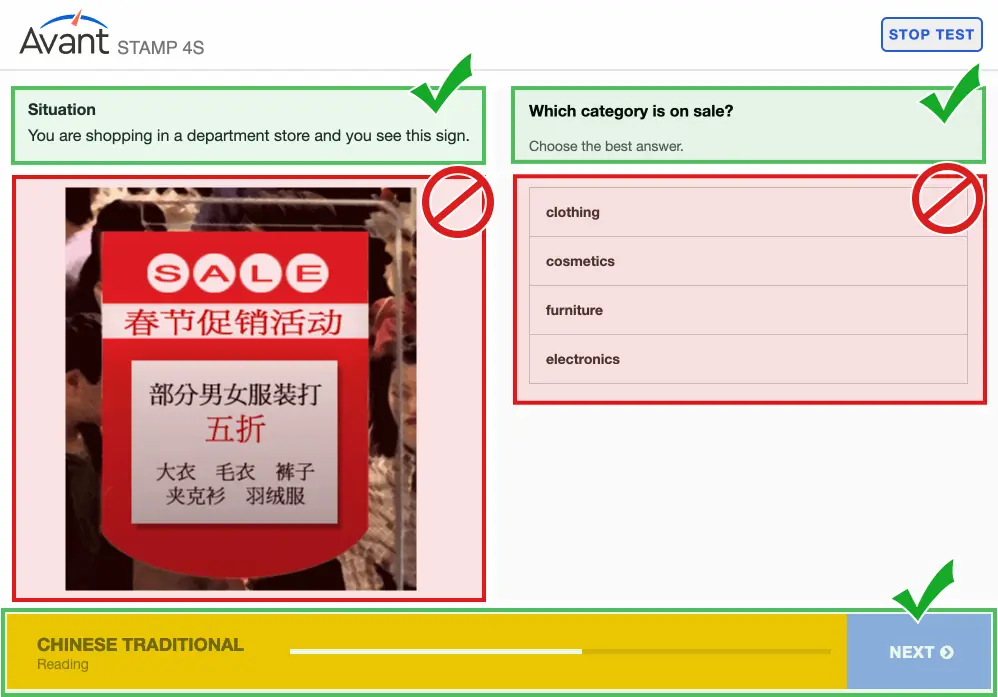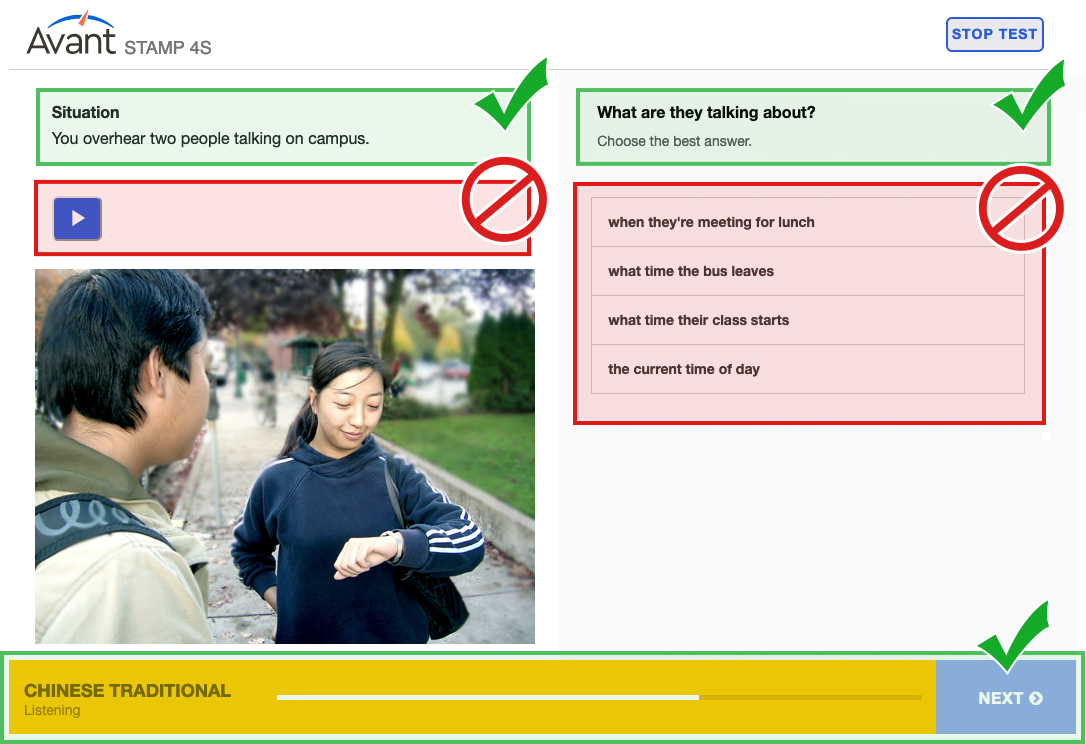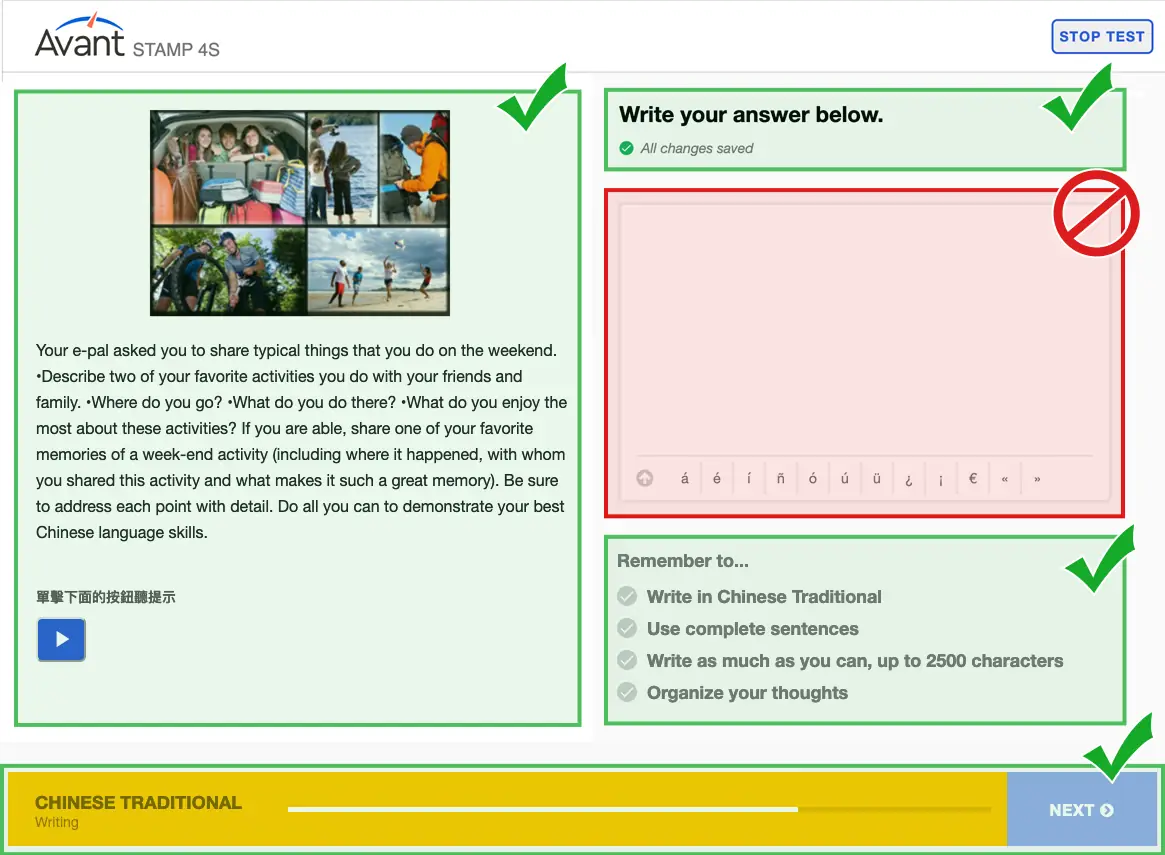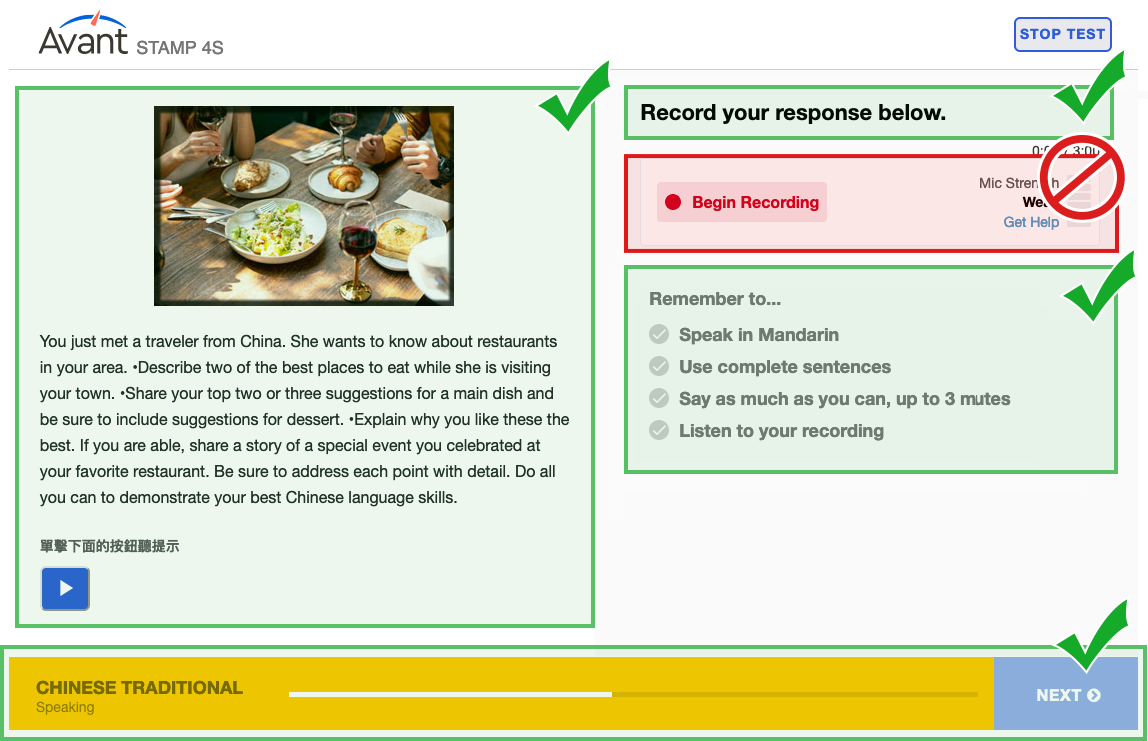Testing Accommodations Policy
Avant allows testing entities (e.g. districts, schools, universities, etc.) to accommodate test takers by following both their specific Individualized Education Program (IEP) directions and the suggestions below. Avant Assessment does not collect requests for accommodations from testing entities or test takers. Test takers are encouraged to work with their testing entities to request appropriate accommodations for each situation.
Avant Assessment’s accommodations policy is intended to comply as closely as possible with Federal, State, and local regulations under section 508. This document provides an overview of supported testing accommodations for Avant’s language assessments to help test takers access each section of the test appropriately and successfully.
Certain sections of the assessment can and should be waived by the testing administrator if necessary. Avant offers different test configurations by request to accommodate the needs of test takers. Please contact your account manager for more information.
Types of Accommodations
Avant’s assessments are designed to provide the current proficiency level of a test taker across one or more modes of communication (Reading, Writing, Listening, and/or Speaking). Each mode is purposely separated into its own section of the test to isolate and focus on that particular area. Any accommodation applied to the test should not change or alter the construct that is being measured. Following are some of the most common approved accommodations.
Blind and Limited Vision
For test takers requesting accommodation other than increasing the zoom level of the screen:
For sections other than the Reading Section
- An Aide can read any of the English portions of the test and can describe, in English, any accompanying photographs or images.
- Avant Assessment provides audio support in the target language for all Writing and Speaking prompts and tasks.
Reading Section
- The Reading Section measures a test taker’s independent reading ability in a target language. Reading the Avant Test Reading Section to a test taker defeats the purpose of the assessment. If an IEP requires tests to be read to test takers, then reading the Avant Test Reading Section aloud is a local decision.
Deaf and Hard of Hearing
- Test takers can skip the Listening section altogether if needed.
For sections other than the Listening Section
- For areas of the test with verbal instructions, an Aide can communicate any of the English portions of the test and can describe, in English or sign language, any accompanying photograph.
Listening Section
- Proctors should plan a time and space for test takers with hearing disabilities (including those with implants) to complete the listening section of the test with adequate audio configuration through the utilization of amplified external speakers or other audio equipment.
Speech Sound Disorder
- Test takers may use extra time and may want to use the Speaking section’s “Add to Recording” feature as well as re-record features for the speaking section of the test.
- Test takers have the ability to skip the Speaking section altogether if needed.
Dyslexic Test Takers
- Dyslexic test takers can have an Aide read any of the English portions of the test – but only the English portions.
Test Time and Breaks
- The most commonly requested accommodation for the assessment is extra time, which can always be allowed for all sections of the test.
- Avant’s test are not timed, test takers can take as long as necessary to complete each section.
- Breaks can be taken at any time, most commonly in-between sections.
- Avant’s tests can be divided into several sessions over as many days as needed.
Limited English Proficiency
Any translation assistance must be approved by either your district, state agency, or workplace administration.
Why are the test questions and instructions in English?
- First, it is critical to make absolutely sure the reason the test taker responded correctly or incorrectly is based on the test taker’s actual comprehension of the authentic text and not the language used in the question. Simply speaking, the English question helps isolate the target language skill being measured.
- Second, in order to ask an appropriate question that addresses the level of the text, the question language level may be far more difficult than the text itself. In other words, the difficulty of the language in the question may prevent the test taker from responding correctly to an authentic text they actually comprehend.
1. Login, Test Taker Profile & Instructions Pages
Any translation assistance must be approved by either your district, state agency, or workplace administration.
- If translation assistance is allowed, these areas (Login, Test Taker Profile & Instructions Pages) are the only areas that can be translated since they do not contain any elements that would be assessed. The goal is for test takers to log in to the test, complete the Test Taker Profile, and understand the instructions about the Reading, Writing, Listening, and Speaking sections.
2. Reading Section (see graphic below)
Any translation assistance must be approved by either your district, state agency, or workplace administration.
- Translation assistance is only allowed for the ‘Situation’ and ‘Question’ elements (see graphic below).
- Do NOT translate any of the authentic text.
- Do NOT translate any of the multiple choice answer options.

3. Listening Section (see graphic below)
Any translation assistance must be approved by either your district, state agency, or workplace administration.
- Translation assistance is only allowed for the ‘Situation’ and ‘Question’ elements (see graphic below).
- Do NOT translate any of the authentic audio.
- Do NOT translate any of the multiple choice answer options.

4. Writing Section (see graphic below)
Any translation assistance must be approved by either your district, state agency, or workplace administration.
- The Writing and Speaking section prompts are provided in written English with testing language audio support.
- Proctors may read the prompt aloud in English, if needed, and explain the overall task.
- Verbal assistance is only allowed for directions and the technical aspects of keyboarding.

5. Speaking Section (see graphic below)
Any translation assistance must be approved by either your district, state agency, or workplace administration.
- The Speaking section prompts are provided in written English with testing language audio support.
- Proctors may read the prompt aloud in English, if needed, and explain the overall task.
- Verbal assistance is only allowed for directions, technical aspects of recording responses, and operating the record and playback buttons.

Accommodation Requests
Avant Assessment does not collect requests for accommodation from test takers. Test takers are encouraged to work with their testing entities (e.g. districts, schools, universities, etc.) to request appropriate accommodations for each situation. Please contact support@avantassessment.com if you have additional questions.